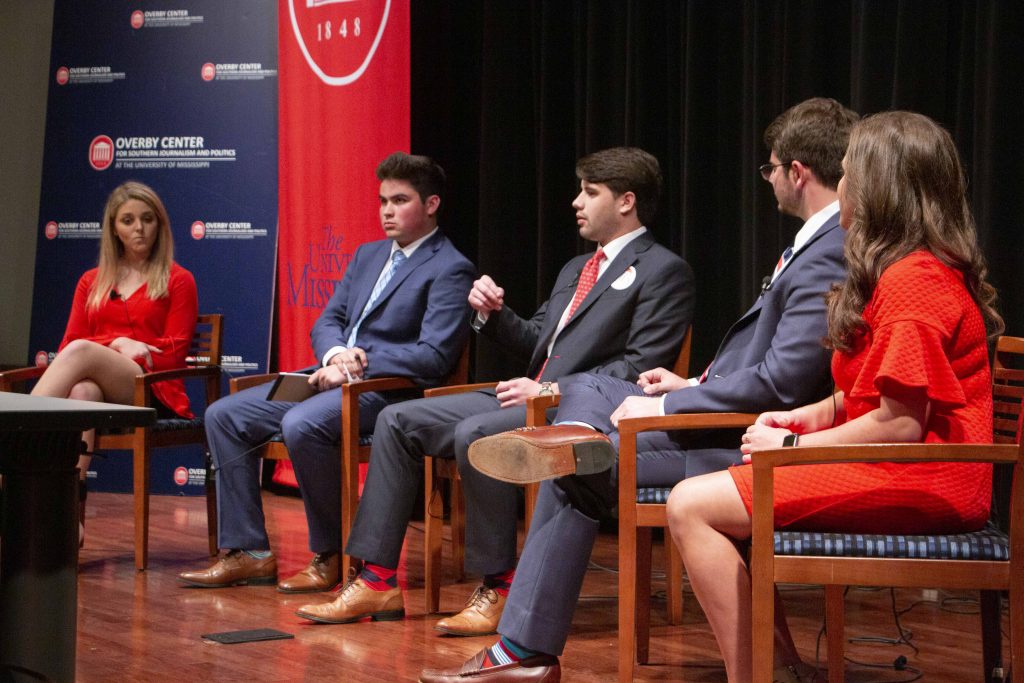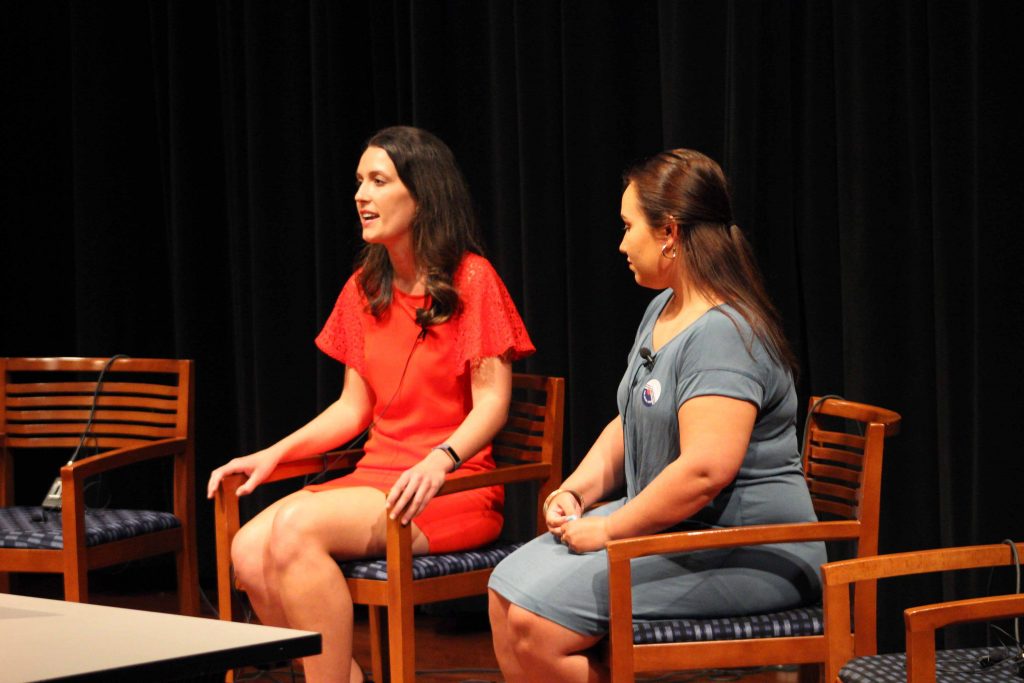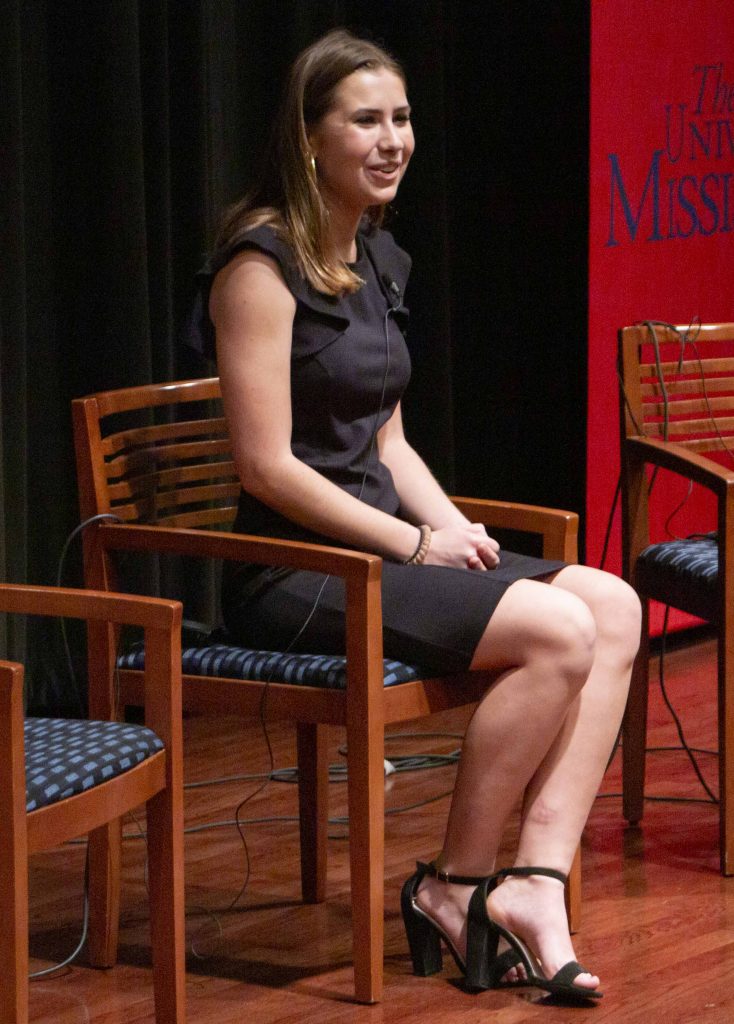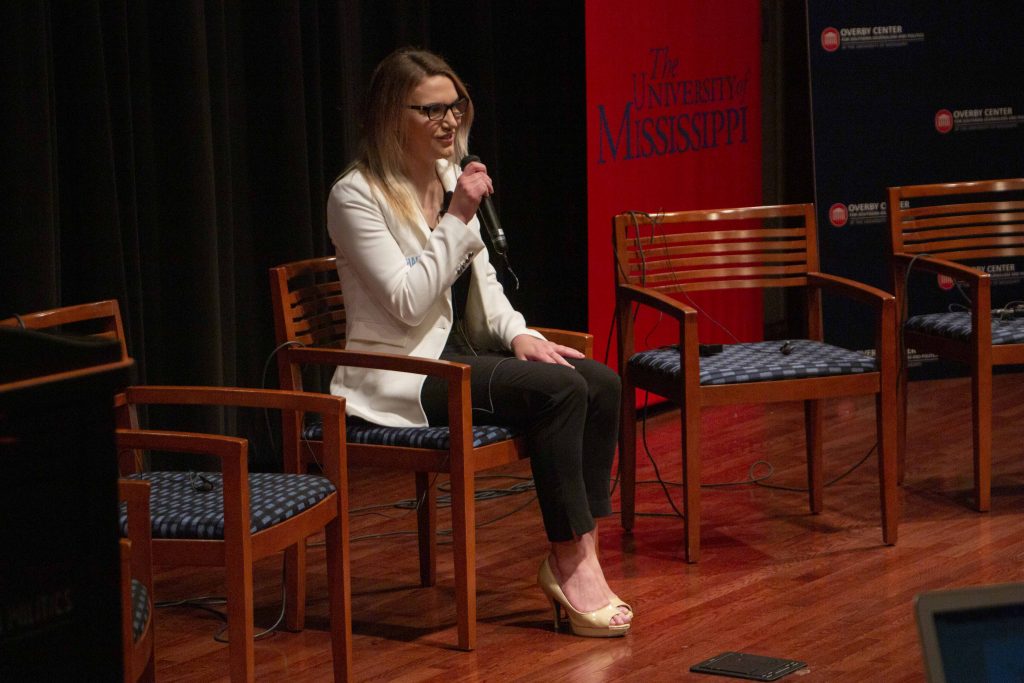The 13 Associated Student Body executive candidates gathered in the Overby Center on Monday night to debate the most prominent issues on the Ole Miss campus — mental health, student involvement and ASB transparency.
Leah Davis, Tom Fowlkes and Barron Mayfield, the three candidates running for ASB president, all sought during the debate to emphasize the current lack of diverse representation in Ole Miss student government.

Mayfield, a junior public policy leadership major from Lubbock, Texas, said students should always come first on campus, especially in ASB’s work.
Fowlkes, a junior public policy leadership and accountancy major from Memphis, said the university is moving in the right direction, and he wants to create firm policy ideas to continue that forward movement.
Davis, a junior psychology major from Tupelo, said mental health and unity on campus are the two largest issues for students. Davis cited the University Counseling Center’s recent policy change limiting students to 10 counseling appointments per semester.
Following Davis’s discussion of the state of mental health care on the Ole Miss campus, Fowlkes and Mayfield agreed that mental health should be a major concern for student government.
The issue of moving the Confederate monument first came up in the debate between the three presidential candidates. Davis co-authored the ASB resolution to relocate the monument from the Circle to the Confederate cemetery, and Mayfield was an active voice in support of the resolution when it was unanimously passed by the ASB Senate.
“The statue is something that is a point of division, and it’s something that we are working with administration on,” Davis said. “We actually just met with the chancellor on Friday.”
Fowlkes was silent on the issue of the statue during the debate, and afterwards, he did not explicitly say whether he supports the relocation of the campus’s Confederate statue.
“I think that our compromise, no matter what side you’re on, is one of the wisest compromises we’ve seen in the entire country,” Fowlkes said.
Fowlkes also made a comment directed at Davis and Mayfield, saying that “no real policy ideas” were brought up by either of his fellow candidates.
Following the debate, Mayfield and Davis said they disagreed with that statement.
“I thought we talked a lot of policy tonight,” Mayfield said. “It’s tough to get your whole platform out there in only three questions, some of which were very direct and specific.”
After the debate, Mayfield expanded on the specific ways in which he hopes to make students a top priority on campus.
“It would be done through advocacy and action,” Mayfield said. “We can’t legislate ourselves a seat on (the state college board), but we can advocate, and we can advocate loudly for that.”
Davis also clarified that her job as co-director of the Elections Reform Task Force and her job as co-director of ASB’s inclusion and cross-cultural engagement committee have separate responsibilities.
“The task force will continue on throughout ASB, and it is not dependent on whether the co-director of inclusion is involved or not,” Davis said.
Fowlkes said he thinks he achieved his goal of demonstrating his personality and goals for the student body at the debate.
“I want people to know who they’re voting on, and you know, that might have come off as nervous, but it was nerve-wracking up there,” Fowlkes said.
Five candidates took the stage for the vice presidential debate. In the night’s most contested category, candidates disagreed on the need for increased training in the ASB Senate and the creation of an ASB liaison to bridge the gap between the Senate and administration.
Sarah Doty, a junior public policy leadership major from Brookhaven, said she wants to make ASB focused on the students, not just on the organization itself.

“I’m running because ASB tends focus a lot on ASB instead of the students,” Doty said. (Students are) busy. We should be there putting ASB at the forefront of their mind. We should try to make meaningful change, whether or not they care.”
Nick Weaver, a sophomore public policy leadership and integrated marketing communications double major from St. Louis, said he wants to get to know students before executing a policy plan. If elected, he said, he will focus on following through on old goals rather than creating new ones.
“Senators need to be meeting students where they already are,” Weaver said. “It’s really not about creating more positions. We have plenty of positions on ASB.”
Charlotte Shackelford, a junior political science major from Mandeville, Louisiana, wants to focus on ensuring that students knowing who their senators are and start a newsletter to inform students about their senators’ activity in ASB.
“I feel like Senate is the heart of ASB,” Shackelford said. “I understand that it’s really hard for people to come to us, so I want to make sure we are going to them.”
J.R. Riojas, a sophomore from Wool Market who is in the Arabic flagship program and is majoring in public policy leadership and philosophy, proposed that the Senate research mental health needs on campus and work toward increasing funding for the counseling center. Multiple candidates agreed that they wanted to do more for mental health care on campus by using the Senate for research and support.
“I really want to help by engaging the community,” Riojas said. “ASB can make our campus a more inclusive and exciting place for people from all over the world.”
Brady Kies, a junior criminal justice major from Birmingham, Alabama, wants to focus on training senators in Senate policies and procedures so that they can be more active in their participation.
“I kind of made a fool of myself this week,” he said, referring to a campaign video he posted on his campaign Facebook page in which he conflated the process of allocating funds from the ASB Internal Budget with the student activity fee. He has since removed the video from his Facebook page.
Two candidates for the office of judicial chair — Brynn Trahan and Liza Boyer — took the stage to debate about “restorative justice” on campus.

Trahan, a junior public policy leadership and integrated marketing communications double major from Fort Smith, Arkansas, wants to continue transitioning from punitive to restorative justice for students.
Disagreement between the two candidates was modest. Both Trahan and Boyer, a junior political science major, focused on increased visibility for the judicial chair not only within the student body but in ASB.
Boyer agreed with Trahan’s approach but added that she wants to solve judicial issues before they become a problem by working with the Title IX office and the University Counseling Center to offer students help before the judicial council becomes involved.
Austin Fiala, a junior public policy leadership and French double major, is the only candidate for attorney general and has already served in the position for the majority of this school year.

Fiala said he wants to ensure justice and accountability for ASB members by creating the new position of deputy attorney general of justice, who would be in charge of holding ASB members accountable to the Code and Constitution.
“Somebody needs to be responsible of holding them to their word and to doing what they are telling students they will,” Fiala said.
Gianna Schuetz, a sophomore accounting and theatre arts double major, is running unopposed for the office of treasurer. She has acted as interim treasurer since Jonathan Cox’s resignation from the position in November 2018.

“One of the most important parts of my platform is increasing the student activity fee,” she said. She proposed a $5 increase in the fee, saying it could have an “extreme” impact on funding for student organizations.
Hannah Chauvin, a junior political science major from Columbus, Ohio, is the sole candidate for secretary, and she highlighted her plan to increase transparency by keeping the ASB website updated.
“My platform is to decrease the information gap between ASB and the student body,” she said.

Interim Attorney General Anya Czerwinski said she was pleased with the overall execution and student turnout of the debate.
“The collaboration between ASB and the student media proved to be effective in carrying out a debate where the candidates participated in thoughtful discussion,” she said. “I’m hopeful that we will find the same success in future years.”
Find more information about all of the candidates here. The ASB general election will be on April 2, and the runoff will be on April 4.


























